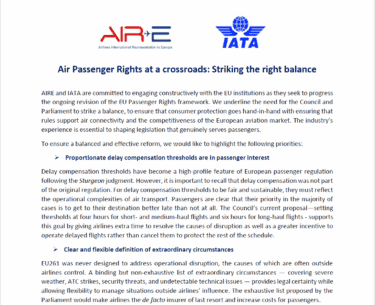On 30 October 2025, the Court of Justice of the European Union (CJEU) published a ruling interpreting Articles 5(1)(c) and 7(1) of Regulation (EC) No 261/2004, which governs passenger compensation and assistance in cases of flight cancellations or long delays.
The case clarified how to calculate the length of a delay when an airline postpones a flight’s departure and arrival and issues a new booking confirmation. The key question was whether the delay should be measured against the original scheduled arrival or the newly communicated arrival time.
- Background
Facts
- Four passengers booked a flight from Munich (Germany) to Antalya (Türkiye) scheduled to depart at 10:20 and arrive at 14:20 on 2 August 2022.
- The day before the flight, they received a new booking confirmation with departure at 11:20 and arrival at 15:20. However, the flight actually departed at 14:37 and arrived at 18:16.
- Passengers, through Myflyright GmbH, claimed €400 each, arguing that the delay exceeded three hours based on the original schedule. Corendon Airlines argued the delay should be measured according to the new confirmation, which would reduce the delay to under three hours and eliminate compensation.
Legal issue
The Landgericht Landshut referred the question to the CJEU:
- Should a long flight delay be calculated based on the original scheduled arrival or the arrival on the new booking confirmation?
This concerns the application of Articles 5(1)(c) and 7(1) of Regulation 261/2004, governing compensation for cancellations and long delays.
- General Court´s judgment
The CJEU ruled that the delay must be measured against the originally scheduled arrival time, not the time in any new booking confirmation. The key reasoning is as follows:
- The Regulation defines “cancellation” but not “delay”; a postponed flight with the same route and flight number is a delay, not a cancellation.
- Passengers are entitled to compensation if they arrive three hours or more after the originally scheduled time, similar to irreversible time loss in cancellations.
- Allowing airlines to reset the reference time via new confirmations would undermine passenger protection, a core objective of Regulation 261/2004.
- Advance notice of the postponement does not change the classification as a delay, although it may mitigate inconvenience.
- Conclusion
The Court of Justice clarified that when an airline postpones a flight and issues a new booking confirmation, the determination of whether passengers are entitled to compensation under Regulation No 261/2004 must be based on the originally scheduled arrival time, not the revised times provided by the airline.
Consequently, passengers who experience delays of three hours or more relative to the original schedule are entitled to compensation.


